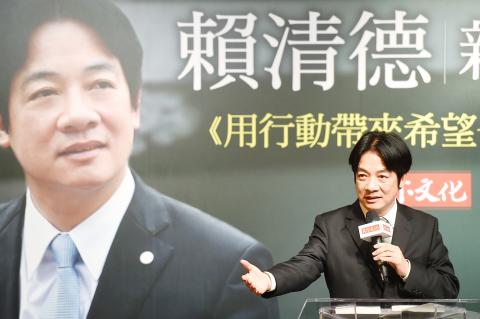The Democratic Progressive Party (DPP) needs to hold a fair, open and “paradigm-setting” presidential primary to regain the public’s trust, former premier and presidential hopeful William Lai (賴清德) said yesterday.
Lai made the remarks at a book launch in Taipei for his memoir Hope Through Action: The William Lai Style of Leadership (用行動帶來希望:賴清德的決策風格), which covers his second term as Tainan mayor and his term as premier.
Lai and President Tsai Ing-wen (蔡英文) last week separately registered for the party’s presidential primary.

Photo: Fang Pin-chao, Taipei Times
Until Lai’s announcement on Monday last week that he would run, which caught many party members off-guard, only Tsai had announced a bid for the party’s nomination.
DPP officials should not be pressured to take sides, the party organization should not mobilize to support one candidate over another, and factions should stay out of the contest, Lai said yesterday.
“The primary is a platform for candidates to talk about their ideals; only by holding a paradigm-setting primary will the DPP gain public support,” he said. “I would rather lose the primary than cause harm to President Tsai Ing-wen.”
Talking about the book, Lai said that he had asked Tsai for her position on several key issues before he agreed to become premier.
According to the book, Lai told Tsai that amendments to the Labor Standards Act (勞動基準法) were severely flawed and requested Tsai’s support for amending the law a second time, which he obtained.
The subject of granting a presidential pardon to former president Chen Shui-bian (陳水扁) was also brought up and Tsai said that she would work toward that goal.
Tsai also promised Lai that he would be able to maintain his pro-independence stance as the premier and that she was committed to pushing constitutional reforms through the Legislative Yuan, he wrote.
“These accounts … attempt to provide a historical record of our achievements and failures, the responsibilities of which must be shared collectively,” Lai said. “There was never any attempt on my part to harm the presidency or to oust Tsai. I will not respond to comments released to the media by a so-called high-ranking DPP official.”
The book was not written to boost his presidential campaign, he said, adding that work on the manuscript began in the third year of his second term as Tainan mayor.
After the DPP’s loses in the nine-in-one elections in November last year, Lai resigned as premier and then added the 500 days of his term as premier to the manuscript, he said.

US President Donald Trump yesterday announced sweeping "reciprocal tariffs" on US trading partners, including a 32 percent tax on goods from Taiwan that is set to take effect on Wednesday. At a Rose Garden event, Trump declared a 10 percent baseline tax on imports from all countries, with the White House saying it would take effect on Saturday. Countries with larger trade surpluses with the US would face higher duties beginning on Wednesday, including Taiwan (32 percent), China (34 percent), Japan (24 percent), South Korea (25 percent), Vietnam (46 percent) and Thailand (36 percent). Canada and Mexico, the two largest US trading

AIR SUPPORT: The Ministry of National Defense thanked the US for the delivery, adding that it was an indicator of the White House’s commitment to the Taiwan Relations Act Deputy Minister of National Defense Po Horng-huei (柏鴻輝) and Representative to the US Alexander Yui on Friday attended a delivery ceremony for the first of Taiwan’s long-awaited 66 F-16C/D Block 70 jets at a Lockheed Martin Corp factory in Greenville, South Carolina. “We are so proud to be the global home of the F-16 and to support Taiwan’s air defense capabilities,” US Representative William Timmons wrote on X, alongside a photograph of Taiwanese and US officials at the event. The F-16C/D Block 70 jets Taiwan ordered have the same capabilities as aircraft that had been upgraded to F-16Vs. The batch of Lockheed Martin

GRIDLOCK: The National Fire Agency’s Special Search and Rescue team is on standby to travel to the countries to help out with the rescue effort A powerful earthquake rocked Myanmar and neighboring Thailand yesterday, killing at least three people in Bangkok and burying dozens when a high-rise building under construction collapsed. Footage shared on social media from Myanmar’s second-largest city showed widespread destruction, raising fears that many were trapped under the rubble or killed. The magnitude 7.7 earthquake, with an epicenter near Mandalay in Myanmar, struck at midday and was followed by a strong magnitude 6.4 aftershock. The extent of death, injury and destruction — especially in Myanmar, which is embroiled in a civil war and where information is tightly controlled at the best of times —

China's military today said it began joint army, navy and rocket force exercises around Taiwan to "serve as a stern warning and powerful deterrent against Taiwanese independence," calling President William Lai (賴清德) a "parasite." The exercises come after Lai called Beijing a "foreign hostile force" last month. More than 10 Chinese military ships approached close to Taiwan's 24 nautical mile (44.4km) contiguous zone this morning and Taiwan sent its own warships to respond, two senior Taiwanese officials said. Taiwan has not yet detected any live fire by the Chinese military so far, one of the officials said. The drills took place after US Secretary